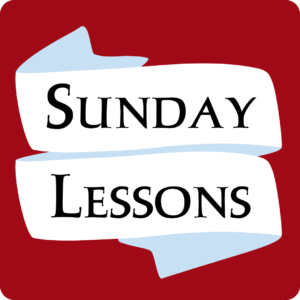Worship Guide for DATE
Like TV Guide, but from God! Find the text of the Prayers of the People and Sermon below. Use the buttons provided to find other worship materials.
To see the Worship Guide for other weeks, click here.
Prayers
Weekly Prayer List Recording:
Prayers of the People (Sunday):
The response to the bidding, “Lord of all life,” is “Hear us”
Lord in time and space: give us courage and persistence to hold fast to the hope that is within us in a world increasingly deaf to the values and expectations of your kingdom. Lord of all life, Hear us.
We pray for the Church and her life: For Sean, Presiding Bishop, and Nicholas, our bishop; for Hosam, Archbishop of Jerusalem, remembering the pastoral outreach of the Diocese of Jerusalem among a sorely oppressed Palestinian Community; for Pope Francis; for Bartholomew, Ecumenical Patriarch; and other Christian leaders. Lord of all life, Hear us.
We pray for the world and its pressing needs: We continue to pray for peace with justice to come to the Holy Lands of Israel, Palestine, Lebanon. We pray for a strengthening of resolve in honoring the fragile ceasefire in Gaza and the return of Gazans hitherto displaced by the war. We continue to pray for Ukraine, for a just and equitable peace settlement to the current conflict, one that honors Western commitment to Ukrainian sovereignty.
In our own nation we pray for immigrant communities vulnerable to capricious executive action. We remember members of the Civil Service whose employment has been summarily terminated, especially when resulting from the invention and promotion of falsehoods. We deplore the Administration’s callous celebration of cruelty and lack of concern for individuals and families affected, and those distressed by the sudden termination of federal benefits. We pray with concern for the return of constitutional process governed by the rule of law. Lord of all life, Hear us.
We remember the earth, our increasingly fragile island home: We pray for a US return to the Paris Agreement on Climate Change. We pray for a strengthening of the emergency services and necessary infrastructure to meet the unprecedented challenge of increasing climate instability. Lord of all life, Hear us.
We pray for all in need: for those whose strength is failing through ill health, whose spirits are flagging through depression, whose determination is being sapped through addiction; that they might know God’s comforting presence and healing.
We remember with love those who have asked for our solidarity in prayer: Mary, Sam, John, Jami, Haleigh, Leigh, Arline, and others we name… Lord of all life, Hear us.
We pray for our own needs, together with those nearest and dearest to us, remembering especially those celebrating birthdays this week: Donald Cunnigen, Merrill Hastings, Jeremiah Parker, Murielle Adadevoh, Philip McMaster, and Kim Worrell. Lord of all life, Hear us.
Rejoicing in the fellowship of so great a cloud of witnesses, we remember those we love but see no longer: especially those we name… We remember those experiencing loss. Lord of all life, Hear us.
Blessings and Woes
The Rev. Mark Sutherland
Luke’s is a political message that confronts every aspect of our status quo where environmental, economic, and social injustice is denied and the self-satisfied pride of the rich is celebrated; where living the kingdom’s expectation for greater social and racial inclusion as a present imperative for the Christian life is dismissed as dangerous wokeness. The Beatitudes – whether seen as universal human rights or present-time obligations- demand a response which if heard, should make us decidedly squirmy.
In an age when calls to make Christendom great again are growing deafening we need the courage to risk new kinds of thinking—about ourselves, our roots, our communities, and our obligations; about God’s relationship with us and our relationships with each other. This is a kind of risky thinking – so writes Mac Loftin in his review of a new translation of Simone Weil’s The Need for Roots in the recent edition of The Christian Century. In 1942, General de Gaulle tasked Weil to write a report on how France could be rebuilt after liberation from German occupation. Weil jettisons the idea of universal human rights in favor of universal human obligations – because recognizing another’s rights does not necessarily change how we treat them.
Taking my English Cocker Spaniel, Mable Rose out at the crack of dawn – living on Exchange St downtown I sometimes witness the trickle of seemingly unhoused persons trudging from the direction of Kennedy Plaza towards the railway station. I’m saddened by the sight of obvious misery. I think – someone should do something!—before going back inside the warmth and security of my building. Weil’s treatise shifts the perspective from an infringement of the universal human rights of the unhoused to my obligation toward them. Every time I lament their plight before moving on, I fail an absolute and unshirkable obligation.
The Beatitudes – are one of Jesus’ most loved, yet also one of the most misunderstood and argued-over of his teachings. The Beatitudes are in Matthew part of Jesus’ Sermon on the Mount. But in Luke, they are delivered as Jesus’ Sermon on the Plain. This difference in location has a greater significance than a mere question of topography. Playing on Simone Weil’s distinction between rights and obligations is it possible to frame the difference between Matthew’s and Luke’s versions of this story as one akin to the difference between a statement of potential rights and a demonstration of present-time obligations?
In Matt. 5:1 we find Jesus retreating from the huge crowds who had flocked to hear him. Climbing a hillside he leads his disciples to a quiet place, where he begins to teach them. In seclusion on the mountaintop Jesus begins Blessed are the poor in spirit for theirs is the kingdom of heaven. Blessed are those who hunger and thirst for righteousness, for they will be filled. Jesus is weaving a beautiful vision of rights and ultimate rewards.
In Luke 6:17: we find Jesus – not retreating up a mountain but coming down from one to stand in the middle of a plain. He stands in the middle of a huge crowd who have come from all over Judea and Jerusalem, even from the seaside towns of Tyre and Sidon seeking to be cured of their ailments. It must have been pandemonium -everyone trying to touch Jesus – healing energy surging from him with every bodily contact. Amid the throng pressing in on him Jesus proclaims Blessed are you who are poor now, for yours is the kingdom of God. Blessed are you who are hungry now, for you will be filled. Instead of a vision of rights and ultimate rewards, Jesus is asking for present-time action within a set of mutual obligations.
Matthew’s Jesus uses the third person form of address to communicate an impersonal objective generality—blessed are they—whereas Luke’s Jesus communicates with the directness of the second person form. He’s not speaking in general; he is talking specifically to you and me.
In Matthew’s Sermon on the Mount, we see Jesus emerging as the new improved Moses, delivering his new model Torah from the mountaintop only to those who constitute the new and improved community of Israel. Whereas Luke’s depiction of this scene in the Sermon on the Plain, shows Jesus emerging as a cosmopolitan healer with a message proclaimed not in the serenity of the mountaintop to a chosen few but to anyone who cares to listen amidst the chaos and din of the world.
Matthew pictures Jesus talking to the in-crowd, his band of trusty disciples – the selected ones who are privy to the secrets of the kingdom of heaven. Luke’s picture is of Jesus talking to anyone who will listen- an approach that assumes that none of us can be included in the kingdom while any one of us remains outside. The message of the kingdom is far from being a secret – it’s laid bare before the public gaze. Luke’s Jesus, having broken out of the straitjacket of Jewish expectation comes down from the lofty isolation of the mountaintop to mix it up with all in sundry. Luke’s Jesus is shockingly intimate with the desperate and seething throng of humanity serging around him. Luke’s Jesus is more than promising a right to be healed – he is acting upon his obligation to heal them. For Luke, the Beatitudes’ are more than rights to an inheritance in heaven. They are obligations to be fulfilled through present-time action.
Not for the first time do we have to straddle the tensions between Matthew’s and Luke’s presentation of Jesus. We must balance Matthew’s emphasis on an inheritance of future fulfillment of kingdom promises through perseverance and courageous faithfulness in the face of present-time suffering with Luke’s emphasis on the kingdom – not as a future inheritance but as a lived reality in the here and now.
Present-time reality is messy. There are forces and conspiracies of power that oppose the values and frustrate the expectations of the Kingdom. Therefore, living the Kingdom in the here and now involves not only promises of future blessings but also naming and calling out the sources of opposition – cursings alongside blessings. Luke’s Jesus shouts out a stinging rebuke to those who through the self-protective interests of wealth and power oppose the implementation of the Kingdom’s values and expectations in the here and now. Jesus is an uncomfortable preacher who blesses those the world curses and curses those the world blesses.
Sunday’s Coming Premium is The Christian Century’s paid-subscription email newsletter—which week-by-week draws from the Century’s archives articles related to the week’s lectionary texts. I’ve already noted Mac Loftin’s review of Simone Weil’s The Need for Roots appearing in this past week’s edition.
In this past week’s Sunday’s Coming Premium newsletter, the editor cites the writer Christopher Morse who in Not Every Spirit demonstrates how the early Christians were persecuted not for what they believed (Jesus Christ is Lord) but for what they refused to believe (Caesar is Lord). Ralph Wood is also cited for pointing out that in the Barmen Declaration of the Confessing Church in Germany, every credimus, “We believe . . .,” is followed by a damnatis, “We reject . .” When it came time for the rest of the German church to say “Nein!” it had lost the theological means to know there was even something about the world worth rejecting, as well as lost the courage to say “No!” Taken out of historical context, this is a powerful message that should resonate within contemporary American Christianity – lest we too lose the theological means to know there is something about the world that needs rejecting and grasp the courage to echo Jesus’ judgment – woe to you who count yourself powerful in this world and brazenly set yourself against the implementation of the values and expectations of the Kingdom’s coming!
Luke’s is a theological message that carries a powerful political punch – confronting every aspect of a status quo where environmental, economic, and social injustice continues to be denied and where the self-satisfied pride of the rich and the powerful is celebrated; where living the Kingdom’s expectation for greater social and racial inclusion as a present imperative for the Christian life is dismissed as mere wokeness. The Beatitudes – whether seen as universal human rights or present-time obligations- demand a response which if heard, should make us decidedly squirmy.





